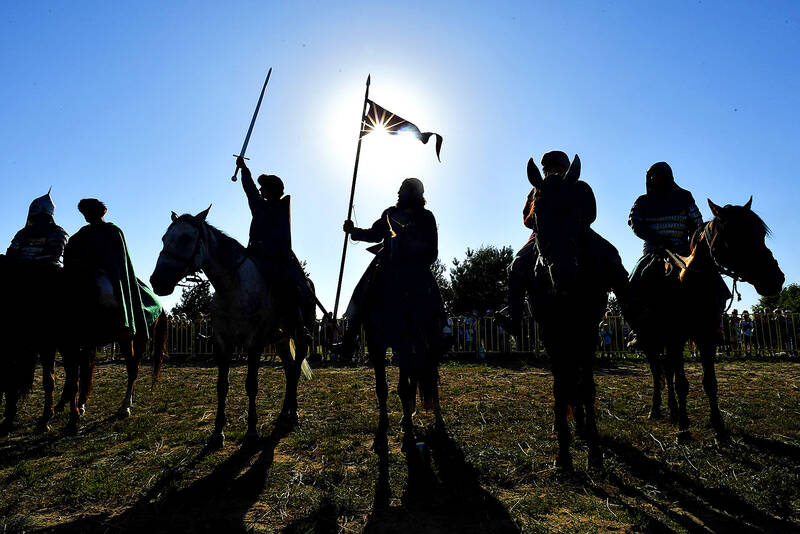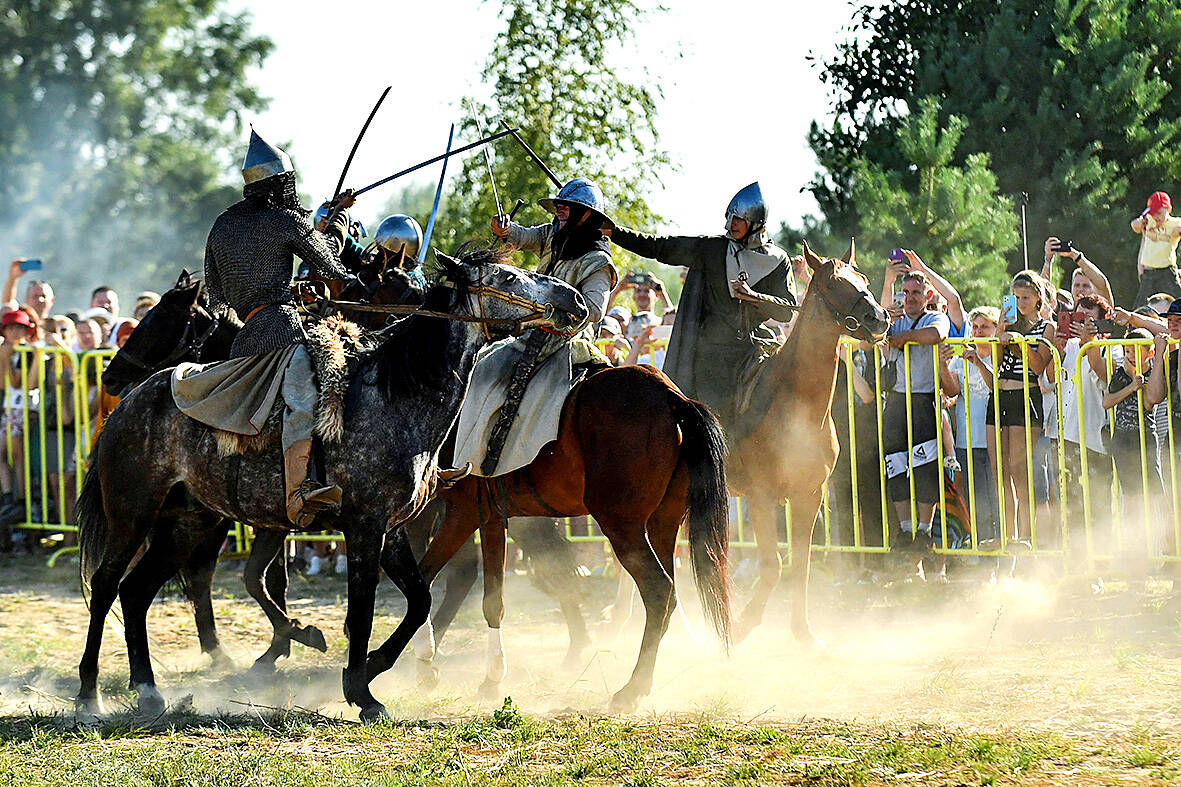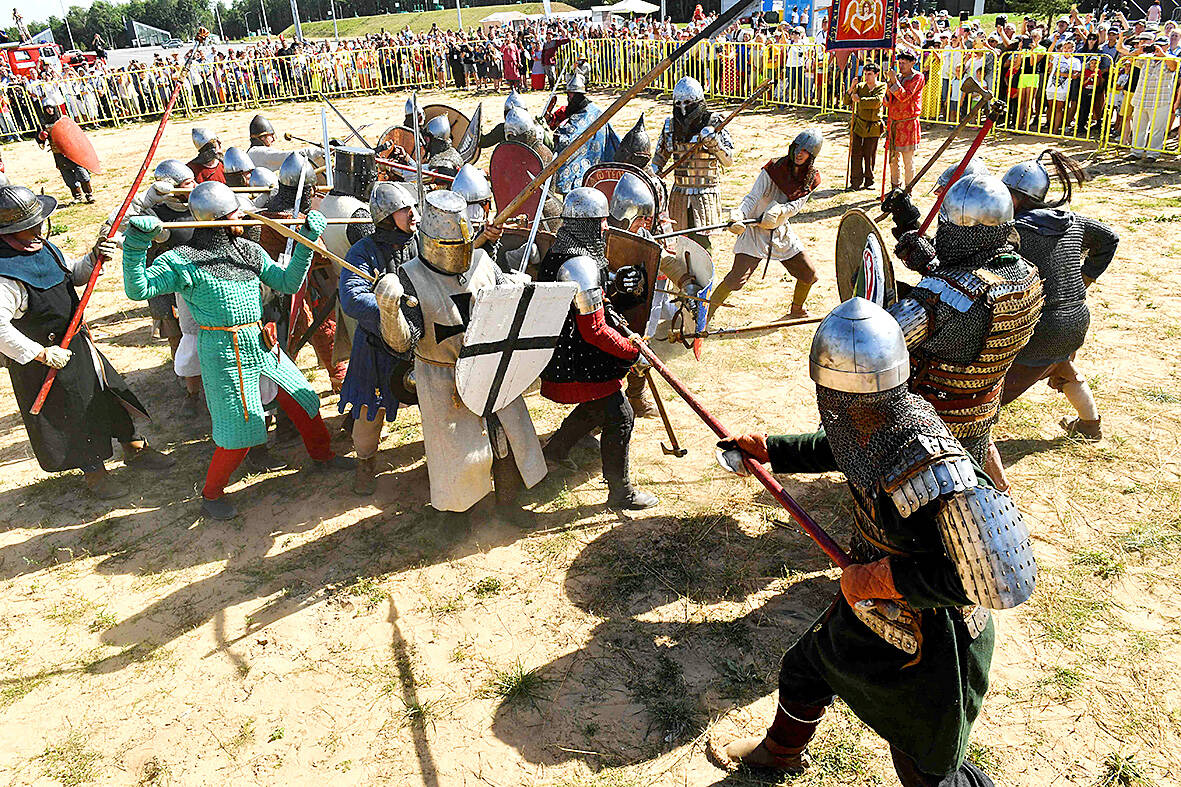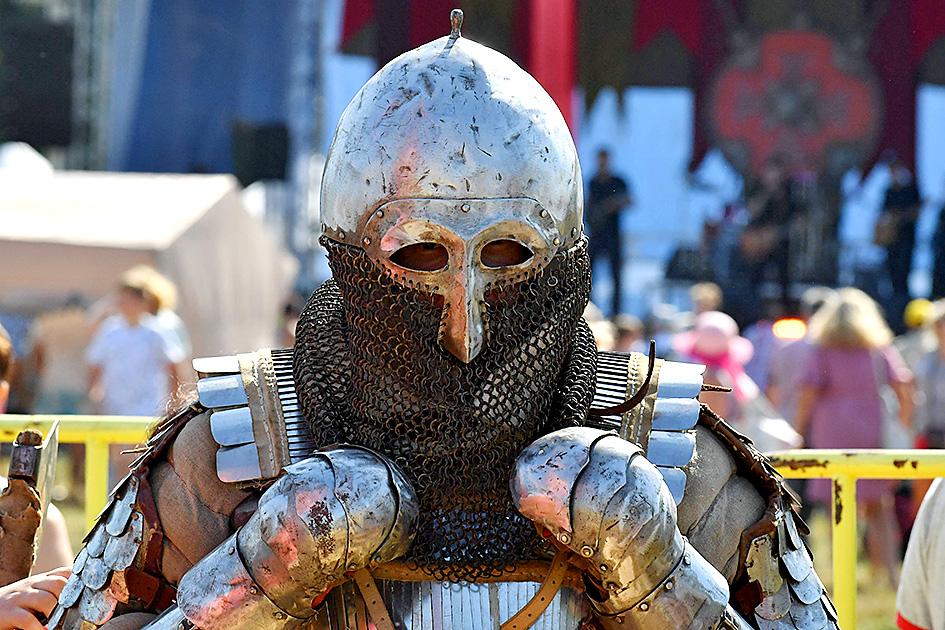Surrounded by dozens of men in chainmail and helmets playing dead in a field, an impersonator of medieval Russian prince Alexander Nevsky raises his sword and roars.
“This land is Russian, always has been, and always will be!”
It was on this spot near Lake Peipus on Russia’s border with Estonia that eight centuries ago Nevsky repelled a force of Teutonic Knights who wanted to convert Russia to Catholicism.

Photo: AFP
Known as the Battle of the Ice because it was fought largely on the frozen lake, the clash in April 1242 is celebrated as a great victory against efforts to turn Russia away from Eastern Orthodox Christianity.
For the hundreds of history enthusiasts re-enacting the battle on a recent August day, that victory is especially resonant today, as Russian forces wage an offensive in Ukraine framed by the Kremlin as part of an enduring conflict with the West.
“We are fighting against Europe just like our ancestors did,” says Oleg Yakontov, a 56-year-old retired paratrooper, holding a sword and shield as sweat drips off his face.

Photo: AFP
Historical re-enactments are a popular pastime in Russia, whether of medieval battles, Napoleonic-era clashes or the fierce fighting of World War II.
Drawing parallels with that history — and with President Vladimir Putin as a kind of successor to figures like Nevsky — is part of the messaging put forward by the Kremlin and Russian state media in support of Moscow’s campaign in Ukraine.
“To me, Nevsky symbolizes the defense of the Motherland and victory,” says 23-year-old Vladislav Vasilyev, still out of breath after taking part in the re-enactment.

Photo: AFP
Several hundred people gathered for the mock battle near the lake, called Lake Chud in Russian. They feasted on grilled meat and listened to live rock music as the combatants pummeled each other on the field.
The event culminated in horseback combat demonstrations a few meters away from a large metal sculpture of Nevsky that was inaugurated last September by Putin and Patriarch Kirill, the head of the Russian Orthodox Church.
“Alexander Nevsky’s personality was truly grandiose,” Putin said at the time, praising him as a “talented commander” and “skilful diplomat.”

Photos: AFP
Part of the modern-day appeal of Nevsky for the Kremlin was his alliance with the great power of the time, the Mongol Empire and its Golden Horde, which had destroyed and seized many of Russia’s lands. For some in Russia, Nevsky’s acceptance of Mongol dominion helped preserve the country’s religious traditions and Eurasian character in the face of Western expansionism.
“His main achievement is this civilizational choice,” says Igor Fomyn, a bearded 52-year-old Orthodox priest in a black cassock who came to watch the spectacle.
“By making this choice, he put spirituality, his people, and his Motherland before comfort,” he says.
Nevsky has been used in the past to stir up patriotic fervor, most famously in Sergei Eisenstein’s landmark propaganda film Alexander Nevsky in 1938.
Made at a time of strained ties between the Soviet Union and Nazi Germany, the film portrayed Nevsky as a heroic figure battling Teutonic domination. It features an epic recreation of the battle at Lake Peipus with the heavily armored crusaders crashing through the ice and drowning — a scene many historians regard as of dubious authenticity.
The film was pulled from cinemas when the USSR and Germany signed a non-aggression pact in 1939, then allowed back onto screens when the Nazis invaded the Soviet Union in 1941.
Nevsky remains a cherished historical figure for many in Russia, and some here have little doubt about who would be his modern counterpart.
“Our president is continuing his work, of course,” says Oleg Davydov, a 52-year-old engineer, in attendance at the re-enactment.
“It’s all about this country’s defense, its strength, its security.”

Towering high above Taiwan’s capital city at 508 meters, Taipei 101 dominates the skyline. The earthquake-proof skyscraper of steel and glass has captured the imagination of professional rock climber Alex Honnold for more than a decade. Tomorrow morning, he will climb it in his signature free solo style — without ropes or protective equipment. And Netflix will broadcast it — live. The event’s announcement has drawn both excitement and trepidation, as well as some concerns over the ethical implications of attempting such a high-risk endeavor on live broadcast. Many have questioned Honnold’s desire to continues his free-solo climbs now that he’s a

Lines between cop and criminal get murky in Joe Carnahan’s The Rip, a crime thriller set across one foggy Miami night, starring Matt Damon and Ben Affleck. Damon and Affleck, of course, are so closely associated with Boston — most recently they produced the 2024 heist movie The Instigators there — that a detour to South Florida puts them, a little awkwardly, in an entirely different movie landscape. This is Miami Vice territory or Elmore Leonard Land, not Southie or The Town. In The Rip, they play Miami narcotics officers who come upon a cartel stash house that Lt. Dane Dumars (Damon)

As Taiwan’s second most populous city, Taichung looms large in the electoral map. Taiwanese political commentators describe it — along with neighboring Changhua County — as Taiwan’s “swing states” (搖擺州), which is a curious direct borrowing from American election terminology. In the early post-Martial Law era, Taichung was referred to as a “desert of democracy” because while the Democratic Progressive Party (DPP) was winning elections in the north and south, Taichung remained staunchly loyal to the Chinese Nationalist Party (KMT). That changed over time, but in both Changhua and Taichung, the DPP still suffers from a “one-term curse,” with the

Today Taiwanese accept as legitimate government control of many aspects of land use. That legitimacy hides in plain sight the way the system of authoritarian land grabs that favored big firms in the developmentalist era has given way to a government land grab system that favors big developers in the modern democratic era. Articles 142 and 143 of the Republic of China (ROC) Constitution form the basis of that control. They incorporate the thinking of Sun Yat-sen (孫逸仙) in considering the problems of land in China. Article 143 states: “All land within the territory of the Republic of China shall